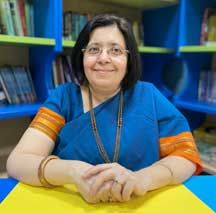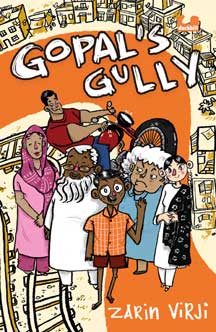Chintan Girish Modi

When was the last time you heard about a school principal from India taking a year-long break to reinvent themselves and pursue a degree in creative writing in the United Kingdom? Meet Zarin Virji, Principal of The Universal School, Tardeo, Mumbai. In this exclusive interview, she talks about the process of writing her debut novel Gopal’s Gully, which was published in 2021 by Duckbill Books, an imprint of Penguin Random House.
This book revolves around Gopal, a Dalit boy from Badriya village, Lakhimpur Kheri district, Uttar Pradesh, who migrates to Mumbai to live with his uncle – Sanjeev Maama – in Squatters Colony after the death of his parents. He takes up a job at the bicycle repair shop run by the kind Abdul Chacha, who offers him food and a new family that invites him to join festival celebrations and picnics on the beach apart from encouraging him to go to school.
How does Gopal adjust to his new surroundings? Does the city offer any respite from caste-based discrimination? Who are the new friends that he makes? What does he want to do with the money he earns? How does he get to know the girl that he has a crush on, and the dog who is his trusted companion? Read this fun-filled and thoughtful book to know more.
Your debut novel Gopal’s Gully is set in Malad, a suburb of Mumbai that you know intimately from your tenure as a principal at Universal High School in Malad. What were some of the most enjoyable aspects of writing it?
The idea for writing Gopal’s Gully emerged from its setting, so I owe everything to the place. I used to drive home through Squatters Colony every evening. A ladder placed against a wall dividing the road from the railway tracks drew my attention one day. Through a crack in the wall, I saw several shacks alongside the railway tracks.
That’s when the idea took root – What if a child lived in one of those shacks? What would his world be like? While the plot didn’t present itself immediately, I was very clear from the start that it would be a fun book, a coming-of-age book perhaps.
My familiarity with this setting made it easy for me to describe it. I could go back to Squatters Colony from time to time and match what I had written with its goings-on. The most enjoyable aspect was developing the character of Gopal. He began to inhabit my being, and speak through me all the time. It felt like I had known him in flesh and blood.
Which characters did you model after people you have met? What challenges did you face while embellishing personality traits, mannerisms and biographical details?
None of the characters are modelled after any specific person but they have risen from my interaction with people who live in shanties or slums. The challenge lay in drawing an authentic portrait of a Dalit orphan from Uttar Pradesh. Newspapers and research articles were helpful but I am well-aware that it still remains an outsider’s perspective. I always imagined the characters talking and ‘feeling’ in Hindi and my job was to kind of ‘translate’ this into English, if you know what I mean.
What gave you the confidence to write about a milieu that makes you feel like an outsider?
The confidence that we are all one human family after all – our fears and joys, struggles and aspirations are similar. Some amount of research and some amount of sensitivity can help us glimpse into each other’s souls.

Gopal’s Gully explores issues like caste discrimination, communal violence, sexual abuse, and suicidal ideation. What age group did you have in mind when you started working on the first draft of the story? Did your understanding of the target readership change over subsequent drafts?
From the beginning I saw it as a book about a child, and not necessarily a children’s book. As far as target readership goes, I would say anyone above the age of 12. The issues explored also just kind of happened, it was not a deliberate ploy to address them. I do not like to thrust morals or values upon children. I believe that it has to be a subtle unfolding or exploration of themes relevant to the world we inhabit. Every aspect of life and every story teaches us something of value. As teachers we can nudge children towards imbibing these lessons without pontificating or hammering the point, ad nauseum.
How would you describe the process of working with your editor and publisher?
Serendipitous and enriching! In early 2017, I had shared an excerpt with Duckbill Books and hadn’t heard back from them. A few months later, Sayoni Basu, the founder-editor of Duckbill and I met at a writer’s retreat in Singapore. Not only did she remember having read the story but she also expressed her willingness to publish it! Her interest in the book came from the fact that very few Indian writers of children’s fiction in English, write about the world of socio-economically challenged children.
Meanwhile I got busy with school work and was hardly writing much. It was her gentle nudges coming every few months that prompted me to seriously sit down and complete the first draft in 2019. She threw questions and suggestions at me to improve upon the book. I found her suggestions helpful and kept at it. At one point she even said that I could go ahead and look for another publisher as the book had shaped well but if I wanted to stick with them, I would have to do a few more revisions. I wanted to stay with Duckbill as we were working well together. Moreover, she had invested time and energy in Gopal’s Gully and, most of all, given it her love when it was half-written! Finally, it was completed to satisfaction for both of us by May 2020.
Did you experience writer’s block? If yes, how did you deal with it?
Sometimes inspiration would strike all of a sudden, in the middle of the night even, and sometimes it would be hours of drudgery but on the whole, writer’s block did not trouble me much.
To what extent did your debut novel benefit from the formal training in creative writing that you received at the University of Sheffield?
Most of all, it got me back to the world of reading. I believe that one has to read endlessly to be able to write. Also, it gave me the confidence to pursue my first love – creative writing – that had sort of evaporated because of other interests and responsibilities. Of course, writing non-fiction related to teaching-learning was very much part of my work in the years preceding this course.
Could you share about the pedagogical approach used in your creative writing programme, especially how it helped you think about plot, characters, setting, and your relationship with your readers?
The M.A. in Creative Writing is a one-year course at the University of Sheffield, where you are given a few guidelines, introduced to a few writers, but most of all encouraged to read and write on your own, be an independent learner. My modules included fiction-writing and poetry. Every assignment was critiqued by peers and tutors. These feedback sessions were very helpful in gaining other perspectives and refining my work.
What changes would you like to see in the way creative writing is taught in Indian schools?
As a teacher of creative writing, my approach is to share pieces of good writing for discussion, give a prompt [visual/auditory/verbal] and then give freedom to each learner to interpret the piece in their unique way. And most important, let students share their work with each other and give and receive feedback. It’s equally important for the teacher to write and share samples of her writing.
When did you first start seeing yourself as an author?
I didn’t start seeing myself as an author but rather felt the compelling need to express myself through prose and poetry ever since I was 12-13 years old. Work that is published brings huge validation and pushes one to write more! My poetry was published in the University of Sheffield’s creative writing journal Route 57 followed by a story in The Best Asian Short Stories 2018, several poems on the Livewire website and a second prize at the Wingword Poetry Prize 2020 and of course, Gopal’s Gully.
What gave you the courage to take a break from your work as a teacher and principal in India, and go to the UK to become a student all over again?
An acute sense of desolation after my mother’s death and the encouragement of a dear friend, prompted me to reinvent myself. I didn’t know anything about courses in creative writing but my childhood friend who lives in the UK, introduced me to these courses and goaded me to go for it. I was, of course, scared of leaving behind everything familiar and going back to being a student at the age of 53, but I was also desperate to find a new meaning and purpose for my life. The first six weeks of newness were miserable but then I began to enjoy my time and made the most of it.
How do you draw upon what you learnt in your current role at work?
Consciously, very little but unconsciously, everything. Being a teacher has helped me understand the world of children and their families closely. Being a principal brings you into contact with different kinds of people and different challenges on a daily basis. Crisis management, conflict resolution, team building, managing stakeholders, all becomes a part of your juggling act. These experiences will find their way into your writing.
What advice would you offer educators who want to learn new skills and explore new areas of knowledge but are too afraid to take risks?
Go for it! Zindagi na milegi dobara.
Zarin Virji is available to do online author visits. She can be reached at zarinvirji@gmail.com
The interviewer loves reading books and makes a living by writing about them. He is particularly interested in stories written for children and young adults. He is in his late thirties but believes that he is quite childlike. He can be reached at chintan.prajnya@gmail.com and on Twitter @chintan_connect.
